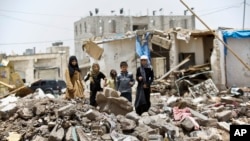The Saudi-led coalition on Tuesday carried out the heaviest airstrikes near the Yemeni capital since a five-day truce with Yemen's Shiite rebels expired earlier this week, hitting weapons depots in the mountains surrounding Sanaa and sending dozens of families fleeing their homes in panic.
The bombardment began shortly after midnight Monday, with airstrikes targeting rebel-held military depots in the mountains of Fag Atan and Noqom, where missiles, tanks and artillery are kept, the residents said.
The Saudi-led coalition has repeatedly struck the two sites since launching the air campaign against the Iranian-backed rebels, known as Houthis, on March 26. But Tuesday's assault was the heaviest since Sunday's expiration of a five-day humanitarian truce, which was repeatedly violated.
By sunset, a fresh wave of airstrikes sent fire and smoke rising from the mountains around the capital, Sanaa. Dozens of families living close to the bombed sites hurriedly loaded their belongings onto vehicles and left in search of safer areas.
Elsewhere in Yemen, missiles hit several Houthi positions in their strongholds in the northern provinces of Saada and Hajjah, as well as a gathering of fighters allied with the Houthis in the city of Ibb, south of Sanaa. The rebels and their allies were also hit in the western city of Taiz and the southern city of Aden, near its airport, as well as in the eastern province of Marib.
Airstrikes also targeted a house owned by ousted President Ali Abdullah Saleh in the Sanaa suburb of Sanhan, flattening it. Saleh's whereabouts are not known but his loyalists within the country's fragmented army have joined ranks with the Houthis. That alliance paved the way for the rebel takeover of Sanaa last September and boosted the rebels' ability to advance into southern cities in an effort to expand their territorial gains.
Fearing more airstrikes, residents in areas around Saleh's other houses - such as in Sanaa's al-Dajaj district - packed up and left in search of safer places. Since the rebel power grab started, most of Saleh's homes have been occupied by Houthi leaders.
"Our house is just next to Saleh's house and most of the people have left. Now the district is like a ghost city," said Fathi al-Udini who also left with his family, fleeing al-Dajaj.
In response to the latest airstrikes, the Houthis fired Katyusha rockets at the Saudi border region of Najran from their stronghold of Saada on Tuesday, according to tribesmen in the region. Nearby, the adjacent border area of al-Jouf province saw heavy clashes between Houthi fighters and tribesmen widely believed to be backed and armed by Saudi Arabia. The battles are meant to open a new frontline with Saada to distract the Houthis from shelling Saudi territories, the tribesmen said.
Late Monday, the rebels also continued to blow up homes belonging to rival politicians and security commanders in Yemen. In the latest in a string of detonations, the Houthis blew up the house of the newly appointed Chief of Staff Mohammed al-Maqdisi in the southwestern city of Dhamar, officials said.
The ground fighting did not stop even during the truce between the Houthis and fighters backing internationally-recognized President Abed-Rabbo Mansour Hadi, now in exile in the Saudi capital of Riyadh.
Houthis and their allies have for weeks been trying to take over Aden, the strategic port city on the Arabian Sea, and the truce has apparently given them time to deploy more troops for that purpose.
A senior military commander in Aden said the rebels and their allies have surrounded the city from three different sides over the past weeks and are now in control of several large sections of Aden. Tens of thousands of civilians have been displaced from the area and pro-Hadi fighters have been given three days to surrender their weapons, he added.
The residents, tribesmen, the commander and all Yemeni officials spoke to The Associated Press on condition of anonymity, fearing reprisals by the Houthis.
The Yemeni conflict has killed 1,820 people and wounded 7,330 since March 19, according to UN estimates. The estimates also show that nearly a half million people at least have been displaced in the period since the beginning of the fighting until May 7.
In a show of support to the Saudi-led operation, a gathering of dozens of Yemeni politicians and tribal figures ended in Riyadh on Tuesday with a declaration that called for the formation of special forces to protect Yemen's cities engulfed in the fighting.
The declaration also called for the formation of "safe zones" where "legitimate" Yemeni institutions could operate, though it gave no clear plan on how to set up such special forces or who would be responsible for the safe zones.
When they started on March 26, it was widely believed that the Saudi-led airstrikes would be followed by ground troops. However, almost two months into the campaign, there has been no sign of imminent deployment of ground forces.
Yemen's Capital Sees Heaviest Airstrikes Since Truce Expired
update

SANA'A —



